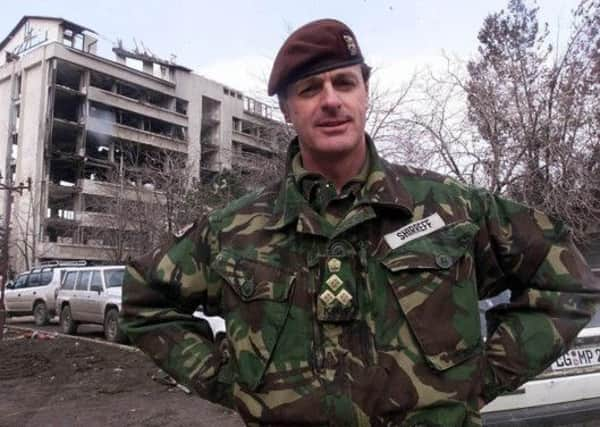Scottish independence plans ‘amateurish’ - general


General Sir Richard Shirreff has warned it is “highly unlikely” Nato would agree to further expansion while the promise of membership made to the Ukraine and Georgia in 2008 was still on the table.
“Given the current crisis in Ukraine, there will be no quick fixes and there can be no certainty about Scottish membership of Nato,” Shirreff wrote in a statement, obtained by Scotland on Sunday.
Advertisement
Hide AdAdvertisement
Hide AdUkraine renewed its application for Nato membership on Friday. The issue will be discussed this week at a Nato summit in Wales.
Shirreff, who recently stepped down as Nato’s deputy supreme allied commander Europe, has described the Scottish Government’s proposals to break-up the British Army to form a Scottish Defence Force as “amateurish”, “unrealistic” and lacking clear strategic purpose.
His statement includes a devastating critique of the Scottish Government defence proposals outlined in its White Paper for independence.
He also warned that the government’s controversial claim that an independent Scotland could join a nuclear defence alliance while removing nuclear weapons from the Clyde could hinder membership, pointing out that if just one of the 28 Nato members votes against Scotland’s membership then its application would fail.
On the SNP’s plans to rid Scotland of Trident missiles, he said: “Nato is a nuclear-armed alliance and all Nato states must accept the principle of nuclear deterrence and being part of Nato nuclear command and control system… it remains unclear how other members of Nato will view the disruption to the coherence of Nato defence caused by moving the submarine fleet out of Scottish waters.”
His most pungent criticism was reserved for the White Paper.
“As an experienced professional soldier, nothing I have seen or heard persuades me Scotland’s safety or security would be enhanced one iota if it became a separate country,” wrote Shirreff, who is of Scottish descent and served in Northern Ireland, Kosovo and Iraq.
“On the contrary, having reviewed the Scottish Government’s White Paper, I find the proposals amateurish, unrealistic and lacking any clear strategic purpose.”
Advertisement
Hide AdAdvertisement
Hide AdHe criticises the document for failing to make any reference to naval aviation arguing that an independent Scotland would need a “primarily naval force”.
Similarly, there was no mention of air-to-air refuelling capability or mountain rescue search and rescue capability.
“The White Paper proposals are dangerous and would leave Scotland, the UK and Nato weakened and less capable of dealing with the threats of today and tomorrow. Scotland deserves better.”
As an example of the “incoherence” of SNP thinking, Shirreff criticised its plans for infantry.
“There are currently six infantry/Guards/Royal Marine units that are Scottish (or Scottish based) plus a further company of Argyll and Sutherland Highlanders,” he wrote.
“Yet the White Paper commits to only three such units.
“More bizarre, the SNP commits to reinstating all the Scottish infantry battalions lost in 2006. It simply doesn’t add up.”
The Scottish Government was also taken to task for failing to produce detail on how an independent Scotland would comply with complex regulations governing defence manufacturing trade agreements.
The paper asked if the SNP government was prepared for “lengthy and torturous” negotiations and wonders what would happen to defence businesses in the meantime.
Advertisement
Hide AdAdvertisement
Hide AdThe White Paper was further criticised for failing to plan for the menace of cyber threats.
Shirreff argued that breaking up the “complex ties of defence and security” which bound the United Kingdom would weaken Nato at a time when Russia was flexing its muscles in Ukraine.
“What is happening in Russia and Ukraine could, unless the nations of the Nato alliance present a strong, united deterrent posture, threaten the security of Nato nations to whose defence we are indissolubly bound, notably the Baltic states.
“Now is the time to strengthen the bonds that tie us together, not to weaken them.”
Shirreff signed off saying: “If you value Scotland’s safety and security now is emphatically not the time to weaken our united defence… As a lifelong professional soldier, I cannot stress enough that it would be an absolute tragedy to break up the one institution which exemplifies the strength of the Union, the British Armed Forces, particularly the British Army.”
Last night Scottish Conservative leader Ruth Davidson said: “Shirreff is one of the most experienced military figures in the land and his knowledge and understanding of global security challenges and the dangers we face is second to none.
“His verdict on the SNP’s threadbare defence plans is utterly damning. The first duty of government is the defence of the nation. On this evidence, the SNP has failed the test.”
The SNP defence spokesman Angus Robertson MP said: “A dangerous and amateurish defence policy would be one that sent troops into an illegal war without proper equipment, while wasting tens of billions of pounds on Trident nuclear weapons that can never be used – that’s the UK.
Advertisement
Hide AdAdvertisement
Hide Ad“Scotland will have strong conventional defence forces within the Nato alliance, just like the vast majority which are non-nuclear members.
“Nato’s own stated intention is for membership to be open to all European democracies that meet the membership criteria – and given that Scotland occupies a key strategic location in the North Atlantic, our continued membership will clearly be in the strong interests of the rest of the alliance.”